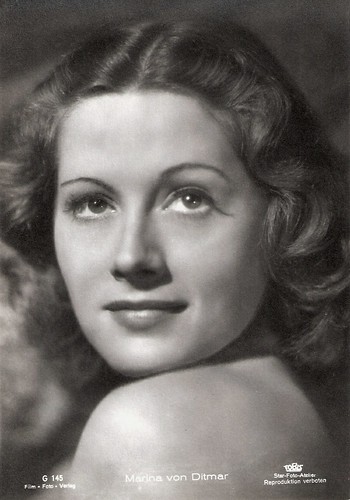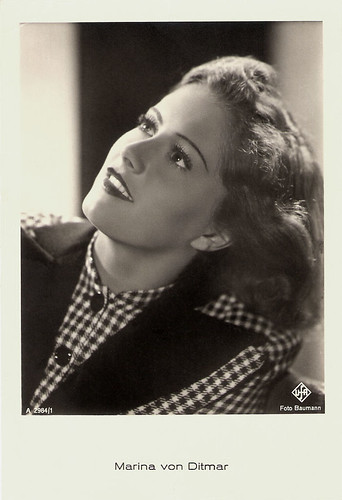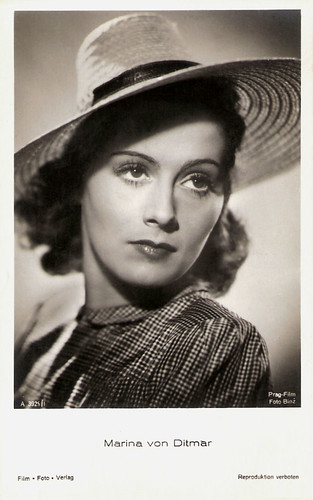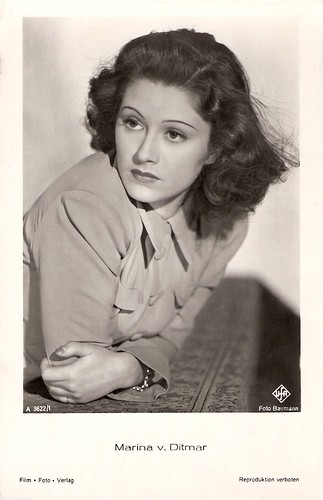German Baltic theatre and film actress Marina von Ditmar (1914) was a popular film star of the Third Reich. She appeared in thrillers, period dramas and comedies, as well as several NS propaganda pictures. At her peak with Universum AG (Ufa), she earned up to 400 Reichsmark per week.

German postcard by Film-Foto-Verlag, no. G 145, 1941-1944. Photo: Tobis / Star-Foto-Atelier.
Marina von Ditmar was born in Petrograd, Russian Empire, now St. Petersburg, Russia, in 1914. She came from the Baltic noble family von Ditmar, which belonged to the Estonian and Livonian knighthood. Her parents were the naval captain Georg von Ditmar and Helene Golovina. After acting lessons with Lucie Höflich and Ilka Grüning, Marina started to work as an actress in the theatre in the mid-1930s.
From 1937 to 1941 she performed at the Volksbühne in Berlin with Eugen Klöpfer. Here, the always elegant-looking actress was seen in dramas and comedies, for example in 'Ein Fallissement' (1938) by Bjørnstjerne Bjørnson and in the plays 'Rose Bernd' (1937) and 'Kollege Crampton' (1938) by Gerhart Hauptmann. The latter was directed by Eugen Klöpfer, who also staged the comedy 'Im sechsten Stock' (1939) by the Frenchman Alfred Gehri with von Ditmar and the world premiere of the play 'Liebe in USA' by Alessandro di Stefani in 1940.
Simultaneously she began to work for the cinema. Her first small role was in the Henny Porten drama Mutter und Kind/Mother and Child (Hans Steinhoff, 1934) and based on the epic poem by Friedrich Hebbel. For the Ufa, she appeared in films like the operetta Das Czardasfürstin/The Csardas Princess (Georg Jacoby, 1934) with Márta Eggerth and Hans Söhnker, the Molière adaptation Der eingebildete Kranke/The Imaginary Invalid (Detlef Sierck a.k.a. Douglas Sirk, 1935) and the drama Stadt Anatol/The City of Anatol (Viktor Tourjansky, 1936) with Brigitte Horney.
During the Third Reich, she played in several Nazi propaganda films, such as Legion Condor (Karl Ritter, 1939) with Paul Hartmann, and Stukas (Karl Ritter, 1941) as a French girl alongside Carl Raddatz.
A highlight was her part as the enchanting Sophie von Riedesel in the lavish and star-studded fairy tale Münchhausen/The Adventures of Baron Munchhausen (Josef von Báky, 1943) featuring popular film star Hans Albers as the last baron Munchhausen.

German postcard by Film-Foto-Verlag, no. A 2984/1, 1939-1940. Photo: Baumann / Ufa.

German postcard by Film-Foto-Verlag, no. A 3825/1, 1941-1944. Photo: Binz / Prag-Film.
After the Second World War, Marina von Ditmar played only in a few more films. Her last film roles were supporting roles in the crime film Kronjuwelen/Crown Jewels (Frantisek Cáp, 1950) with Sybille Schmitz, and the comedy Mutter sein dagegen sehr (Viktor Tourjansky, 1951) featuring Ilse Werner.
In 1952 she finished her career and completely withdrew from the spotlights.
In 1949, she married doctor Hans-Georg Dehnhardt, chief doctor and owner of the sanatorium Kurländer Haus in Bad Kissingen. Thanks to their personal contacts in the Beau Monde, the couple could receive in the following decades, many prominent guests in his private sanatorium.
Guests included the Thai royal couple Bhumibol and Sirikit Adulyadej and Federal President Heinrich Lübke and his wife.
Hans-Georg Dehnhardt died in 2001. Marina Dehnhardt lived in Bad Kissingen until her death, where she died on 3 September 2014 - around two months before her 100th birthday. She was laid to rest in the Parkfriedhof cemetery there. She was survived by her stepson, the documentary filmmaker Sebastian Dehnhardt.

German postcard by Film-Foto-Verlag, no. A 3622/1, 1941-1944. Photo: Baumann / Ufa.
Source: Stephanie D’heil (Steffi-line - German), Wikipedia (German), and IMDb.
This post was last updated on 14 January 2024.

German postcard by Film-Foto-Verlag, no. G 145, 1941-1944. Photo: Tobis / Star-Foto-Atelier.
Münchhausen
Marina von Ditmar was born in Petrograd, Russian Empire, now St. Petersburg, Russia, in 1914. She came from the Baltic noble family von Ditmar, which belonged to the Estonian and Livonian knighthood. Her parents were the naval captain Georg von Ditmar and Helene Golovina. After acting lessons with Lucie Höflich and Ilka Grüning, Marina started to work as an actress in the theatre in the mid-1930s.
From 1937 to 1941 she performed at the Volksbühne in Berlin with Eugen Klöpfer. Here, the always elegant-looking actress was seen in dramas and comedies, for example in 'Ein Fallissement' (1938) by Bjørnstjerne Bjørnson and in the plays 'Rose Bernd' (1937) and 'Kollege Crampton' (1938) by Gerhart Hauptmann. The latter was directed by Eugen Klöpfer, who also staged the comedy 'Im sechsten Stock' (1939) by the Frenchman Alfred Gehri with von Ditmar and the world premiere of the play 'Liebe in USA' by Alessandro di Stefani in 1940.
Simultaneously she began to work for the cinema. Her first small role was in the Henny Porten drama Mutter und Kind/Mother and Child (Hans Steinhoff, 1934) and based on the epic poem by Friedrich Hebbel. For the Ufa, she appeared in films like the operetta Das Czardasfürstin/The Csardas Princess (Georg Jacoby, 1934) with Márta Eggerth and Hans Söhnker, the Molière adaptation Der eingebildete Kranke/The Imaginary Invalid (Detlef Sierck a.k.a. Douglas Sirk, 1935) and the drama Stadt Anatol/The City of Anatol (Viktor Tourjansky, 1936) with Brigitte Horney.
During the Third Reich, she played in several Nazi propaganda films, such as Legion Condor (Karl Ritter, 1939) with Paul Hartmann, and Stukas (Karl Ritter, 1941) as a French girl alongside Carl Raddatz.
A highlight was her part as the enchanting Sophie von Riedesel in the lavish and star-studded fairy tale Münchhausen/The Adventures of Baron Munchhausen (Josef von Báky, 1943) featuring popular film star Hans Albers as the last baron Munchhausen.

German postcard by Film-Foto-Verlag, no. A 2984/1, 1939-1940. Photo: Baumann / Ufa.

German postcard by Film-Foto-Verlag, no. A 3825/1, 1941-1944. Photo: Binz / Prag-Film.
Private sanatorium
After the Second World War, Marina von Ditmar played only in a few more films. Her last film roles were supporting roles in the crime film Kronjuwelen/Crown Jewels (Frantisek Cáp, 1950) with Sybille Schmitz, and the comedy Mutter sein dagegen sehr (Viktor Tourjansky, 1951) featuring Ilse Werner.
In 1952 she finished her career and completely withdrew from the spotlights.
In 1949, she married doctor Hans-Georg Dehnhardt, chief doctor and owner of the sanatorium Kurländer Haus in Bad Kissingen. Thanks to their personal contacts in the Beau Monde, the couple could receive in the following decades, many prominent guests in his private sanatorium.
Guests included the Thai royal couple Bhumibol and Sirikit Adulyadej and Federal President Heinrich Lübke and his wife.
Hans-Georg Dehnhardt died in 2001. Marina Dehnhardt lived in Bad Kissingen until her death, where she died on 3 September 2014 - around two months before her 100th birthday. She was laid to rest in the Parkfriedhof cemetery there. She was survived by her stepson, the documentary filmmaker Sebastian Dehnhardt.

German postcard by Film-Foto-Verlag, no. A 3622/1, 1941-1944. Photo: Baumann / Ufa.
Source: Stephanie D’heil (Steffi-line - German), Wikipedia (German), and IMDb.
This post was last updated on 14 January 2024.
No comments:
Post a Comment